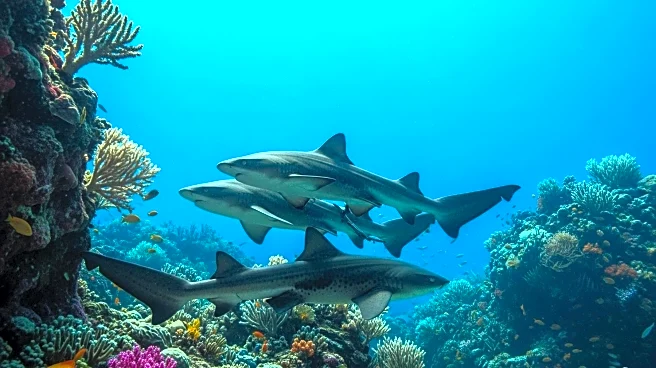What's Happening?
Marine biologists have recorded leopard sharks mating in the wild for the first time, revealing a unique 'threesome' interaction. The event was filmed by Hugo Lassauce, a marine biologist at the University of the Sunshine Coast, during a dive in New Caledonia. The encounter involved two male sharks and one female, with the males holding onto the female's pectoral fins for over an hour before mating sequentially. This observation provides new insights into the reproductive behavior of leopard sharks, which are listed as endangered by the International Union for Conservation of Nature. The study aims to understand the genetic diversity of the species and improve conservation efforts.
Why It's Important?
The recording of leopard sharks mating in the wild is significant for understanding the genetic diversity and reproductive strategies of this endangered species. Insights from this study could inform conservation efforts, such as improving artificial insemination protocols. The observation highlights the importance of studying marine life in their natural habitats to develop effective conservation strategies. As leopard shark populations decline, understanding their mating behavior is crucial for ensuring their survival and maintaining biodiversity in marine ecosystems.
What's Next?
Researchers plan to continue studying the reproductive behavior and spatial ecology of leopard sharks. Future research will focus on egg-laying habitats and the movements of newly hatched sharks. Genetic studies will be conducted to determine the number of fathers contributing to the batches of eggs laid by females each year. These efforts aim to enhance conservation strategies and ensure the survival of leopard sharks in the wild.
Beyond the Headlines
The study of leopard sharks' mating behavior in the wild could lead to broader implications for marine conservation. Understanding the genetic diversity and reproductive strategies of endangered species is crucial for developing effective conservation policies. This research highlights the importance of preserving natural habitats and studying marine life in their natural environments to ensure the survival of endangered species.












